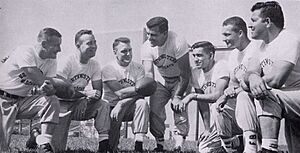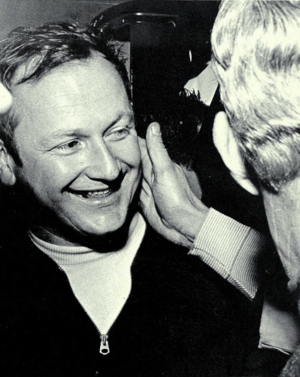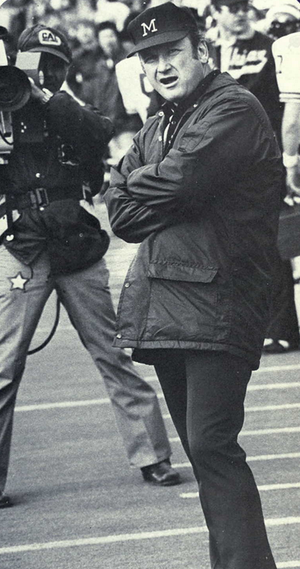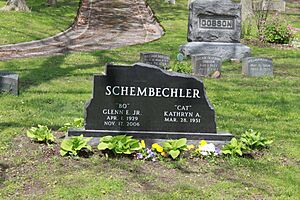Bo Schembechler facts for kids
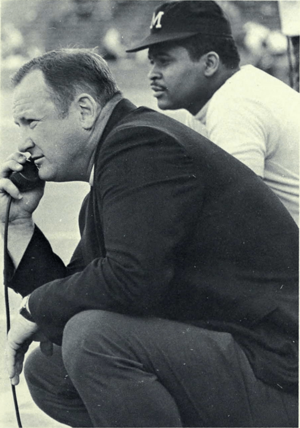
Schembechler from 1970 Michiganensian
|
|
| Biographical details | |
|---|---|
| Born | April 1, 1929 Barberton, Ohio, U.S. |
| Died | November 17, 2006 (aged 77) Southfield, Michigan, U.S. |
| Playing career | |
| 1948–1950 | Miami (OH) |
| Position(s) | Tackle |
| Coaching career (HC unless noted) | |
| 1951 | Ohio State (GA) |
| 1954 | Presbyterian (assistant) |
| 1955 | Bowling Green (freshman) |
| 1956–1957 | Northwestern (assistant) |
| 1958–1962 | Ohio State (assistant) |
| 1963–1968 | Miami (OH) |
| 1969–1989 | Michigan |
| Administrative career (AD unless noted) | |
| 1988–1990 | Michigan |
| 1990–1992 | Detroit Tigers (president) |
| Head coaching record | |
| Overall | 234–65–8 |
| Bowls | 5–12 |
| Accomplishments and honors | |
| Championships | |
|
|
| Awards | |
|
|
| College Football Hall of Fame Inducted in 1993 (profile) |
|
Glenn Edward "Bo" Schembechler Jr. (born April 1, 1929 – died November 17, 2006) was a famous American college football player, coach, and sports leader. He was the head football coach at Miami University from 1963 to 1968. Later, he coached the University of Michigan from 1969 to 1989. In his career, he won 234 games, lost 65, and tied 8. Only a few coaches have won 200 games faster than him.
During his 21 years leading the Michigan Wolverines, his teams won 194 games, lost 48, and tied 5. They also won or shared 13 Big Ten Conference titles. Even though his Michigan teams never won a national championship, they almost always finished ranked among the top teams.
Schembechler played college football as a tackle at Miami University. There, he was coached by Woody Hayes, who later became his boss at Ohio State University. When Schembechler coached Michigan, his teams had a huge rivalry with Hayes's Ohio State teams. This intense period was called the "Ten-Year War."
In 1988, Bo also became the athletic director at Michigan. He stopped coaching football after the 1989 season. His assistants, Gary Moeller and Lloyd Carr, took over. After leaving Michigan in 1990, he became president of the Major League Baseball team, the Detroit Tigers, until 1992. He was added to the College Football Hall of Fame in 1993. Bo Schembechler passed away in 2006 at age 77, right before a big game between Michigan and Ohio State.
Contents
Bo's Early Life and Football Beginnings
Bo Schembechler was born and grew up in Barberton, Ohio. His nickname "Bo" came from his sister, who tried to say "brother" when they were little. His father was a firefighter. Bo often shared a story about his dad refusing to cheat on an exam, even when others might have. This taught Bo a lot about being honest and having integrity.
Bo went to Miami University in Ohio. He played football there under two very different, but legendary, coaches. His first coach, Sid Gillman, was known for new offensive ideas. Later, Woody Hayes became his coach. Hayes was tough and focused on running the ball and perfect plays. Hayes had a big impact on Bo, and they became lifelong friends.
After college, Bo earned his master's degree at Ohio State University in 1952. He worked as an assistant coach under Woody Hayes there. After serving in the U.S. Army, Bo coached at a few other colleges. In 1958, Hayes brought him back to Ohio State, where Bo became one of his most trusted assistants for five more years.
Coaching at Miami University
In 1963, Bo Schembechler returned to his old school, Miami University, to become their head coach. For the next six seasons, his teams had a great record of 40 wins, 17 losses, and 3 ties. They won two Mid-American Conference titles and finished second three times. Their best year was 1966, when Miami won 9 games and lost only 1.
Bo was considered for the head coach job at Wisconsin in 1967. However, he felt the hiring committee wasn't serious about him, so he decided not to take the job. This experience later influenced him to convince another famous coach, Bob Knight, to turn down an offer from Wisconsin too.
Leading the Michigan Wolverines
Bo Schembechler became the head coach for Michigan in 1969. The athletic director, Don Canham, hired him very quickly, sensing Bo's strong drive to win. At Michigan, Bo became one of college football's greatest coaches. He won a record 194 games for the school, losing only 48 and tying 5. His teams never had a losing season.
In the Big Ten Conference, his record was 143 wins, 24 losses, and 3 ties. His Michigan teams won or shared 13 Big Ten titles and played in the Rose Bowl 10 times. In the 1970s, his winning record was the best of any coach in college football's top division. Bo led his teams to 17 bowl games in total, winning 5 and losing 12. He was named national coach of the year in 1969.
The Famous "Ten-Year War"
Bo's biggest win came in his first season at Michigan. His team upset a top-ranked Ohio State team coached by his old mentor, Woody Hayes. The year before Bo arrived, Michigan had lost badly to Ohio State, 50-14. Hayes even tried for a two-point conversion at the end, saying he would have gone for three if he could.
In 1969, Ohio State was the defending national champion, ranked #1, and had won 22 games in a row. But Bo's Michigan team, with a 7-2 record, beat Ohio State 24-12. This win brought Michigan football back to being one of the best programs. Both Bo and Hayes, who remained friends, agreed it was Hayes's best team and Bo's most important victory. This game is still seen as one of the biggest upsets in college football history.
After this, Michigan and Ohio State had a fierce "Ten Year War" for a decade. This made their rivalry one of the greatest in college football. For ten years, these two teams dominated the Big Ten Conference, sharing all the titles. Bo had a slight edge in this rivalry, winning 5 games, losing 4, and tying 1.
Bo's time at Michigan also saw the return of the rivalry with Notre Dame. These two schools are very close and have many wins, but they hadn't played each other since the 1940s. Bo was good friends with Notre Dame's coach, Ara Parseghian, which helped bring the rivalry back.
Even though Bo's teams were very successful during the regular season, they struggled in bowl games. His overall bowl record was 5 wins and 12 losses, including 2 wins and 8 losses in the Rose Bowl. He even had a heart attack the day before his first Rose Bowl in 1970. However, the Michigan teams that didn't go to a bowl game were almost perfect, losing only three games combined.

In 1980, Bo's team won their first Rose Bowl by beating the Washington Huskies. This team, led by star player Anthony Carter, started slowly but finished strong. They didn't allow a single touchdown in their last five games. Bo believed this team was the best in the country by the end of the season.
During the 1980s, Bo's teams started to pass the ball more, but he was still known for preferring to run the ball. He famously said, "there are three things that can happen when you pass, and two of them are bad." His teams continued to win consistently. In 1985, Jim Harbaugh, who later became a famous NFL quarterback and Michigan coach, led the team to a 10-1-1 record and a win in the Fiesta Bowl. They finished ranked #2, which was the highest ranking for one of Bo's teams.
Bo retired from coaching after the Rose Bowl in 1990. He was 60 years old and had health concerns. He chose Gary Moeller, his offensive coordinator, to take over as head coach.
Beyond Coaching: Athletic Director
Bo also served as Michigan's athletic director from 1988 to 1990. Before the 1989 NCAA basketball tournament, the men's basketball coach, Bill Frieder, announced he was leaving for another school. Bo immediately fired him, famously saying, "a Michigan man is going to coach a Michigan team." He appointed assistant coach Steve Fisher as interim head coach. Fisher then led the Michigan team to win the 1989 national championship! Bo watched this exciting overtime game, which happened two days after his 60th birthday.
"Those Who Stay Will Be Champions"
When Bo started coaching at Michigan, he had a special saying for his players: "Those who stay will be champions!" This phrase showed how tough his new system would be. He wanted his players to be strong and dedicated, with much harder practices than they were used to.
In his first training camp in 1969, about 140 players started, but only 75 stayed. Those who remained embraced Bo's system. Because of his success, this slogan became famous. Every Michigan football player who stayed for four years under Bo won at least one Big Ten championship. Also, no Michigan player ever had a losing season while playing for him. "Those Who Stay Will Be Champions" is still a beloved slogan for the Michigan Wolverines today.
Offer from Texas A&M
In 1982, Texas A&M offered Bo Schembechler a huge contract, almost $3 million over 10 years. This was the biggest contract in college sports at the time. But Bo turned it down. He said, "Frankly, I've come to the conclusion that there are things more important in this world than money. For that reason, I've decided to stay at Michigan." This showed his strong loyalty to Michigan.
After Coaching: Detroit Tigers and Later Life
From 1990 to 1992, Bo Schembechler was the president of the Detroit Tigers baseball team. During this time, he was involved in the decision to let go of the Tigers' long-time radio announcer, Ernie Harwell. This decision was not popular with fans.
Bo kept an office at the University of Michigan's football building, which is now named Schembechler Hall. His former assistants, Gary Moeller and Lloyd Carr, became head coaches after him. Bo was also involved in many charities. He even hosted a sports radio show called "Big Ten Ticket," where he talked about Michigan and other Big Ten teams.
In 2005, the University of Michigan gave Bo an honorary law degree.
Health Challenges and Legacy
Bo Schembechler had heart problems for many years. He had his first heart attack in 1969, the day before his first Rose Bowl game. He had another in 1987. He underwent two major heart surgeries.
In October 2006, Bo collapsed while taping his TV show and had a heart pacemaker put in. He was still adjusting to it a week before he passed away.
Death
On November 16, 2006, Bo attended the funeral of a close friend. That night, he gave his usual pep talk to the Michigan football team before their big game against Ohio State. He talked about his friend and how working hard and sticking together could make them great Michigan men. He ended by telling them to remember "the team, the team, the team!"
The next day, November 17, 2006, Bo collapsed and passed away at age 77. His doctor said he died from severe heart problems. He died the day before one of the biggest games in the history of the Michigan–Ohio State football rivalry.
A few days later, the University of Michigan held a memorial service for Bo at Michigan Stadium. About 20,000 fans, former players, and coaches attended to honor him. Bo is buried in Forest Hill Cemetery in Ann Arbor, Michigan.
Before he died, Bo had agreed to be an honorary pallbearer for former Michigan player and U.S. President Gerald Ford. When Ford passed away later that year, a Michigan stadium blanket was placed on a pew in the Washington National Cathedral in Bo's memory.
Personal Life
In 1968, Bo married Mildred (Millie) and adopted her three sons: Donald, Geoffrey, and Matthew. Later, Bo and Millie had their own son, Glenn III, also known as Shemy. Millie Schembechler passed away in 1992 after battling a rare form of cancer. She was 63 years old.
Coaching Tree
Many coaches and players who worked with Bo Schembechler went on to become head coaches themselves. This shows his lasting impact on football.
Some of the coaches who played under Bo:
- Woody Hayes: Miami (OH)
Some of the coaches who worked as assistants under Bo:
- Lloyd Carr: Michigan (1995–2007)
- Jim Harbaugh: Michigan (2015–2024)
- Les Miles: LSU (2005–2016)
- Gary Moeller: Michigan (1990–1994)
- Bill McCartney: Colorado (1982–1994)
Some of Bo's former players also became head coaches:
- Jim Harbaugh: Michigan (2015–2024)
- Les Miles: LSU (2005–2016)
Also, three of Bo's former players – Dave Brandon, Jim Hackett, and Warde Manuel – later became the athletic directors for the University of Michigan.
Images for kids
See also
- List of college football coaches with 200 wins
- List of presidents of the American Football Coaches Association
 | Lonnie Johnson |
 | Granville Woods |
 | Lewis Howard Latimer |
 | James West |


